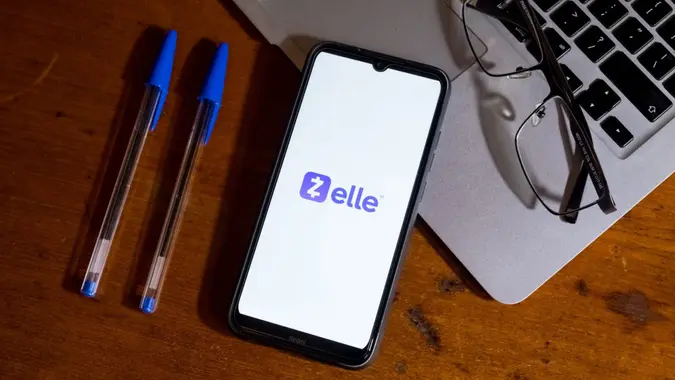Chase Is Changing a Key Zelle Policy: How It Could Hurt (or Help) Your Side Gig

Commitment to Our Readers
GOBankingRates' editorial team is committed to bringing you unbiased reviews and information. We use data-driven methodologies to evaluate financial products and services - our reviews and ratings are not influenced by advertisers. You can read more about our editorial guidelines and our products and services review methodology.

20 Years
Helping You Live Richer

Reviewed
by Experts

Trusted by
Millions of Readers
If you use digital payment apps, you might be aware of how easy it can be for scammers to try to target you and your money.
In fact, the problem has become so serious that Chase is making a policy change when it comes to Zelle, the popular app used for digital payments. Here’s a closer look at what’s changing, why and how it could impact consumers with side gigs.
What’s Changing?
Starting March 23, if you’re a Chase customer, Zelle payments identified as coming from contact through social media won’t be allowed. As part of its website dedicated to helping customers avoid social media scams, Chase said the change is being made because Zelle is designed to pay people you know, not strangers you meet on social media.
In other words, Chase wants to stop fraud before it happens. The bank noted that nearly half of scams reported to Chase originate on social media.
However, as reported by CNET, Chase may delay or hold payments so there’s time for you to gather information and authenticate the payment.
How Could It Impact Your Side Gig?
If nothing else, perhaps the move by Chase is a reminder to anyone with a side gig to be cautious of scams. It can be easy to lose money when dealing with people you don’t know online without purchase protection. As Chase noted, if something goes wrong with a Zelle transaction, you likely won’t get your money back. This may also give you reasons to pause and consider how you’re vetting customers or individuals with whom you want to do work.
For those who may use Zelle for side gigs, be sure that your contacts for payment aren’t originating through social media to avoid complications.
If social media is a big part of your business and you’re looking to make a switch, there are plenty of other options. You can send or receive money with platforms such as PayPal, Apple Pay or Google Pay. Since there are so many other avenues for doing business, it’s probably a safe bet the change won’t hurt your side gig too much.
And if you’re able to make it a selling point, this policy change could help your side gig. You could market yourself as a knowledgeable professional who understands the dangers of social media scams and works to protect your customers and clients.
 Written by
Written by  Edited by
Edited by 

























